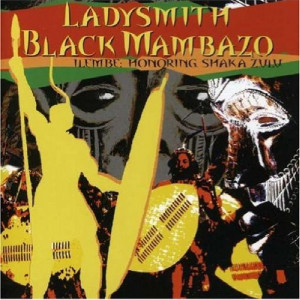 For anyone who heard Paul Simon’s Graceland and was captivated by the South African choir that is Ladysmith Black Mambazo; for those who have followed their career and been entranced by their dancing and just their look, here is the latest in a long line of CD releases that proves their brilliance once again. They have released albums honoring Shaka Zulu in the past. Their first album after Graceland introduced them to a worldwide audience was called Shaka Zulu (Warner Bros, 1987), but it was an attempt to have them synthesize the folk-pop of Simon’s songs with their own unique style … and gently break them in to North America. They were simply too strong to be led astray, and as they show on the new Ilambe they are best when they simply do what they do.
For anyone who heard Paul Simon’s Graceland and was captivated by the South African choir that is Ladysmith Black Mambazo; for those who have followed their career and been entranced by their dancing and just their look, here is the latest in a long line of CD releases that proves their brilliance once again. They have released albums honoring Shaka Zulu in the past. Their first album after Graceland introduced them to a worldwide audience was called Shaka Zulu (Warner Bros, 1987), but it was an attempt to have them synthesize the folk-pop of Simon’s songs with their own unique style … and gently break them in to North America. They were simply too strong to be led astray, and as they show on the new Ilambe they are best when they simply do what they do.
And sing together is what they do best!
Like an African doo-wop group combined with a gospel choir, Ladysmith, under the leadership of the great Joseph Shabalala, sound fantastic on this recording. Their harmonies are pure and gentle. The clicks and hoots that come from the native Zulu tongue add an exotic touch, but never distract from the enjoyment of the music. These melodies are simple yet engaging, the lyrics seem repetitive, syllables repeated again and again, and yet the listener is caught up in the wash of pure sound as these masters ply their craft.
Most of the lyrics are in Zulu, and appear in the original language in the booklet. They are not translated but rather explained by a brief note at the bottom of the page. There are a couple of English songs, and you can get a sense of the structure of the Zulu songs by following along with the lyrics of the English tracks. Words are repeated, sentences are put together slowly like a jigsaw puzzle. Subject matter is often praise to God or a lesson about life. For instance “Hlala Nami” is described thus: “Birds of the same feather flock together, Your elders are available to show you the way.” “Asekhon’ Amatshitshi” says this: “This is advice to the young ones to take good care of themselves in order to be succesful in the future.” If you have a knowledge of what’s going on in Africa these days, the message takes on more meaning.
This is an acoustic, unplugged album all ’round. No instruments aside from the remarkable vocal cords of the eight men who make up Ladysmith Black Mambazo. Celibrate with them as they sing tribute to the great Zulu chief Shaka Zulu, or to their Almighty God, Prince of Peace.
(Heads Up Africa, 2008)
